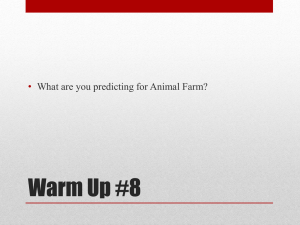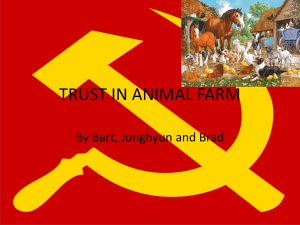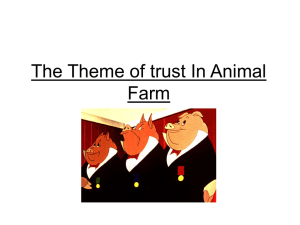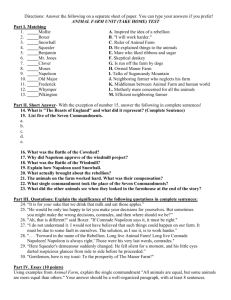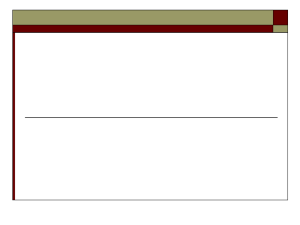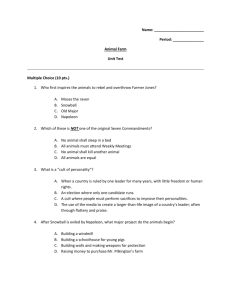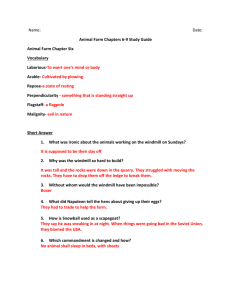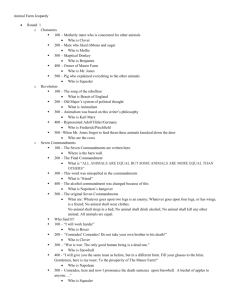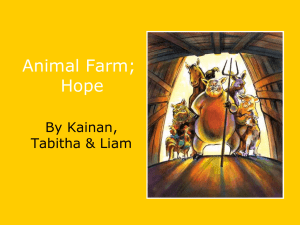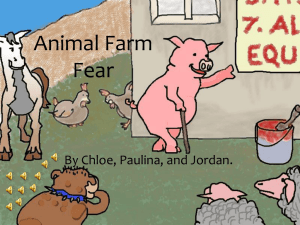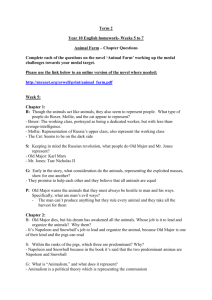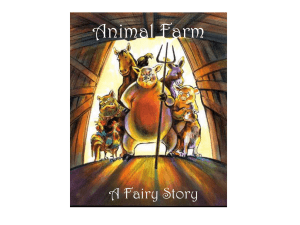Animal Farm
advertisement
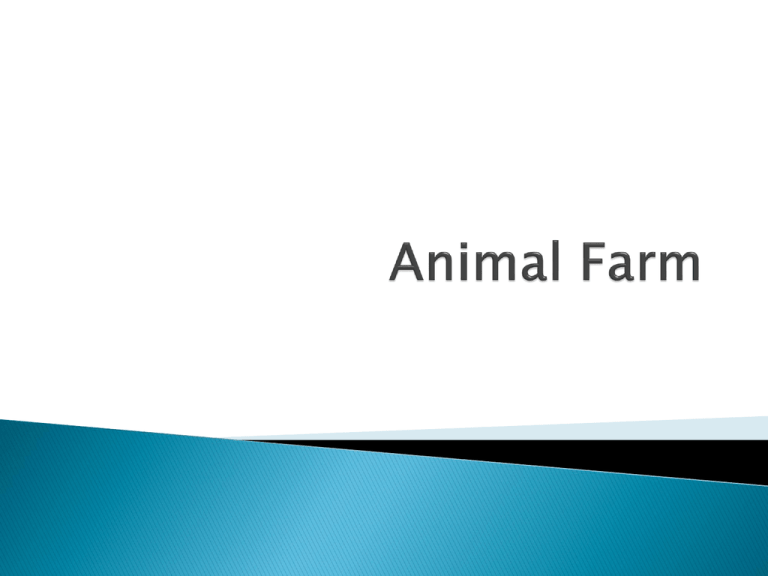
The story is set on a farm in England. The historical events referred to in the allegory actually took place in Russia in the first half of the twentieth century. By setting the fable in his own country, however, Orwell makes it clear that his themes are universal. What happened in Russia could just as easily happen in anyone’s backyard. Mr. Jones – Owns the Manor Farm Is a drunkard who mismanages his farm Represents the last Czar of Russia Old Major – Is a wise and benevolent prize boar. Is highly respected by the animals. Is a visionary dreamer and philosopher Is the author of the Beast of England Dies three days after revealing his dream Represents Marx and Lenin. SnowballIs a great planner and organizer. Speaks well Is considered by the others not to have depth of character. Tries to implement Old Major’s ideas. Represents Trotsky Napoleon – Is a large fierce-looking boar Is not a talker but is used to getting his own way Is secretive, ruthless, and cunning Is considered by others to have depth of character Represents Stalin Squealer – is a small fat pig with twinkling eyes and round cheeks, who moves nimbly and has a shrill voice. Is a brilliant and persuasive talker. Is Napoleon’s spokesman and propagandist. Boxer – is a tall, strong cart horse. Is loyal and hard-working. Is well-meaning but not very intelligent. Coins the slogans “I will work harder” and “If Comrade Napoleon says it, it must be right.” Represents the unthinking working class. Benjamin – is a donkey Is the worst-tempered and the oldest animal on the farm Is a loner who keeps his opinions to himself Is a skeptical of change Never laughs Is a hard worker who never shirks his duties but never volunteers Knows how to read but says there is nothing worth reading Says “Donkeys live a long time” Is devoted to Boxer Clover – is a hard-working mare Is not very intelligent Is loving and maternal toward the other animals Is the only animal whose thoughts are revealed Mollie – is a vain white mare. Enjoys pretty ribbons, sugar, and human attention Is the only animal to leave the farm willingly May symbolize the White Russians, who posed the Red Army during the civil war Muriel – is a white goat Is a good reader Moses – is a raven Was Mr. Jones’s pet Flees with Jones but is later welcomed back by the pigs Is given beer by the pigs, even though he does not work. Soothes the animals with his story of Sugarcandy Mountain Represents the Russian Orthodox Church and religious institutions in general Minimus – is a pig who composes songs and poems honoring Napoleon. The sheep – bleat whatever slogan they are taught by the pigs. Represent the unthinking masses The Dogs – are vicious killers who protect the pigs and do their bidding. Represent Stalin’s secret police. Mr. Pilkington – owns the neighboring Foxwood Farm. Spends too much time fishing and hunting to run his farm efficiently Represents England and the Allies Mr. Frederick – Owns the neighboring Pinchfield Farm Cheats Napoleon and leads a disastrous attack on the farm. Represents Germany. Mr. WhymperIs a lawyer who serves as an intermediary between Napoleon and the outside world. Is sly and self-serving. Ensconced – settled comfortably Tushes – tusks Knacker – horse slaughterer Trotter – pig’s foot Dissentients – those who disagree Mangel-wurzels – large beets Vivacious – lively Expounded – explained Gambolled – skipped playfully Scullery – kitchen storage area Chapter 1 – Old Major reveals his dream. The animals learn Beasts of England. Chapter 2 – Old Major dies. The animals drive out Mr. Jones. “The Manor” Farm becomes “Animal Farm.” The Seven Commandments of Animalism are written by the pigs. Chapter 3 – The animals run the farm. Snowball organizes committees. Napoleon educates the puppies. Chapter IV Mr. Jones tries to recapture the farm, but he and the other farmers are driven off in the Battle of Cowshed Chapter V Snowball proposes a windmill. Napoleon signals the dogs to drive Snowball away. Napoleon cancels Sunday debates and announces that the windmill will be built after all. Chapter VI Napoleon announces trade with the humans The pigs move into the farmhouse Napoleon blames Snowball for the collapse of the windmill Chapter VII The hens protest when Napoleon decides to sell their eggs. Squealer tells the animals that Snowball was in league with Mr. Jones from the start. The dogs kill Napoleon’s enemies and some self-confesses traitors. Napoleon abolishes the singing of Beasts of England. Chapter VIII Mr. Frederick pays for the pile of timber with forged banknotes. Mr. Frederick and the other farmers attack the farm and destroy the windmill but are driven off by the animals in the Battle of the Windmill. The pigs celebrate their “victory” by getting drunk. Chapter IX Boxer collapses and is taken away by the slaughterer Squealer says that Boxer died in the hospital The pigs hold a memorial banquet for themselves in Boxer’s honor. Chapter X Few animals remain who remember life before the rebellion. The pigs walk on hind legs, carry whips, and become indistinguishable from humans. “Animal Farm” becomes “The Manor Farm.”
